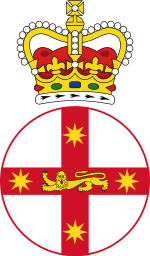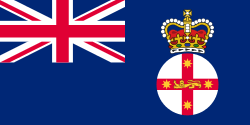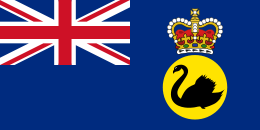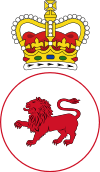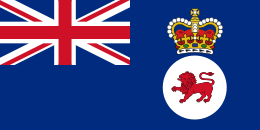Gerald Strickland, 1st Baron Strickland
| The Right Honourable The Lord Strickland, Count della Catena GCMG | |
|---|---|
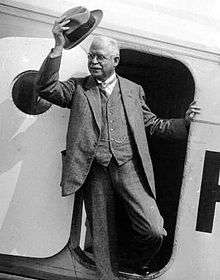 | |
| 4th Prime Minister of Malta | |
|
In office 9 August 1927 – 21 June 1932 | |
| Monarch | George V |
| Governor | |
| Preceded by | Sir Ugo Mifsud |
| Succeeded by | Sir Ugo Mifsud |
| 23rd Governor of New South Wales | |
|
In office 14 March 1913 – 27 October 1917 | |
| Monarch | George V |
| Premier | |
| Preceded by | Lord Chelmsford |
| Succeeded by | Sir Walter Davidson |
| 15th Governor of Western Australia | |
|
In office 31 May 1909 – 16 March 1913 | |
| Monarch | |
| Premier | |
| Preceded by | Sir Frederick Bedford |
| Succeeded by | Sir Harry Barron |
| 9th Governor of Tasmania | |
|
In office 28 October 1904 – 20 May 1909 | |
| Monarch | Edward VII |
| Premier | John Evans |
| Preceded by | Sir Arthur Havelock |
| Succeeded by | Sir Harry Barron |
| Personal details | |
| Born |
24 May 1861 Valletta, Malta |
| Died |
22 August 1940 (aged 79) Attard, Malta |
| Political party | Constitutional Party |
| Spouse(s) |
|
| Children | Eight |
| Alma mater | Trinity College |
Gerald Paul Joseph Cajetan Carmel Antony Martin Strickland, 6th Count della Catena, 1st Baron Strickland, GCMG (24 May 1861 – 22 August 1940) was a Maltese and British politician and peer, who served as Prime Minister of Malta, Governor of the Leeward Islands, Governor of Tasmania, Governor of Western Australia and Governor of New South Wales, in addition to sitting successively in the House of Commons and House of Lords in the Parliament of the United Kingdom.
Early life
Strickland was born in Valletta, the son of naval officer Commander Walter Strickland, from the ancient English Strickland family of Sizergh, and Maria Aloysia Bonici-Mompalao, the niece and heiress of Sir Nicholas Sceberras Bologna, fifth Count della Catena in Malta, whom Gerald succeeded in 1875. He was educated at St Mary's College, Oscott, and Trinity College, Cambridge (BA, LLB).[1] Upon graduating, he was admitted to Inner Temple in 1887 entitled to practice as a Barrister-at-Law. He gained the rank of Major in the service of the Royal Malta Militia.
Elected in 1886 to the council of the government of Malta, Strickland began to take an active part in Maltese politics at an early age and in December 1887, he accompanied Dr. Fortunato Mizzi – founder of the Maltese Nationalist Party – to the first Colonial Conference in London to submit a scheme for a legislative assembly. The result was that the new Maltese Constitution of December 1887 was largely based on the joint Strickland-Mizzi proposals. In the following year, he was appointed as Assistant Secretary to Malta in 1888 and held the office of Chief Secretary of Malta in 1889, a post which he held till 1902 when to avert more trouble in Malta which were created by his orders in councils to increase taxation, he was appointed as Governor of the Leeward Islands in the Caribbean (1902 to 1904). He was then appointed as Governor of Tasmania (1904 to 1909) and Governor of Western Australia (1909 to 1913). In the early years consequent upon Australian Federation he was involved in the delicate matter of State rights and the developing nature of the appointment, role and salaries of governors. Appointed as Governor of New South Wales in March 1913, on 30 May 1913 he was made a Knight Grand Cross of the Order of St Michael and St George (GCMG).[2]
Political career
In 1917, Strickland returned to Malta and, after the grant of Self-Government, formed the Anglo-Maltese Party in 1921, which soon afterward amalgamated with the Maltese Constitutional Party to become the Constitutional Party under his leadership. Strickland was the leader of the Opposition between 1921 and 1927. In 1924, he won the seat of Lancaster for the Conservatives in the United Kingdom House of Commons. He left the House of Commons in 1928 upon being made a peer.
After the 1927 election, Strickland had a majority in the Legislative Assembly and became Head of the Ministry (the fourth Prime Minister of Malta) from August 1927 until June 1930. Amongst the most important events of his government were the commencement of building works for St. Luke's Hospital in Gwardamanġia and his clash with the Senate, which led to the issue of Letters Patent which curtailed its powers and his concurrent clash with the ecclesiastical authorities. On 1 May 1930, Archbishop Mauro Caruana and Gozo bishop Mikiel Gonzi issued a pastoral letter, read in all the churches of Malta and Gozo. In it they declared that whoever voted for the Constitutional Party and its former coalition partner, the Labour Party, committed a mortal sin. That year he narrowly avoided assassination.[3]
This mortal sin was also committed by those who read Strickland's newspapers, printed by his Progress Press, namely the Daily Malta Chronicle and Ix-Xemx. He subsequently began publishing Il-Progress and Il-Berqa. The clash between the Catholic bishops and the Constitutional Party led to the suspension of the Maltese Constitution following consultations between the British Governor and London. Between July 1932 and November 1933, Strickland was again the leader of the Opposition, and after the grant of a new Constitution in 1939, he became the leader of the elected majority in the Council of Government.
Personal life
Strickland married Lady Edeline Sackville-West (1870–1918), the daughter of the 7th Earl De La Warr and the Honourable Constance Mary Elizabeth Cochrane-Wishart-Baillie, on 26 August 1890. They had six daughters, and two sons who died at an early age. Their first daughter married Henry Hornyold, became known as Mrs Hornyold-Strickland and chaired the Conservative Party Conference in 1947.[4] They had the following children:
- Reginald Strickland (1892–1893)
- Hon. Mary Christina Strickland (1896–1970)
- Hon. Cecilia Victoria Strickland (1897–1982)
- Hon. Mabel Edeline Strickland OBE (1899–1988)
- Margaret Angela Strickland (1900–1901)
- Hon. Henrietta May Strickland (1903–1975)
- Walter Strickland (1901–1902)
- Hon. Dr. Constance Teresa Strickland LMSSA (1912–1979)
In 1926, following the death of Lady Edeline in 1918, Strickland married Margaret Hulton, daughter of the newspaper proprietor Edward Hulton. She was made a Dame of the Order of the British Empire (DBE) in the 1937 Coronation Honours.[3] Strickland was appointed a Companion of the Order of St Michael and St George (CMG) in 1889, for rendering invaluable services during a severe cholera epidemic. He was promoted within the order to KCMG in 1897. He was raised to the Peerage of the United Kingdom as Baron Strickland, of Sizergh Castle in the County of Westmorland, on 19 January 1928.[5] He died at Villa Bologna, his residence in Attard, and is buried in the family crypt at St. Paul's Cathedral, Mdina.
Titles, styles and honours
| Viceregal styles of Sir Gerald Strickland | |
|---|---|
|
| |
| Reference style | His Excellency |
| Spoken style | Your Excellency |
| Alternative style | Sir |
Titles
- 24 May 1861 – 1878: Gerald Strickland, Esq.
- 1878–1889: Gerald Strickland, Count della Catena
- 1889–1897: Gerald Strickland CMG, Count della Catena
- 1897–1902: Sir Gerald Strickland KCMG, Count della Catena
- 1902–1904: His Excellency Sir Gerald Strickland KCMG, Count della Catena, Governor of the Leeward Islands
- 1904–1909: His Excellency Sir Gerald Strickland KCMG, Count della Catena, Governor of Tasmania
- 1909–1913: His Excellency Sir Gerald Strickland KCMG, Count della Catena, Governor of Western Australia
- 1913–1913: His Excellency Sir Gerald Strickland KCMG, Count della Catena, Governor of New South Wales
- 1913–1916: His Excellency Sir Gerald Strickland GCMG, Count della Catena, Governor of New South Wales
- 1916–1921: Sir Gerald Strickland GCMG, Count della Catena
- 1921–1924: Sir Gerald Strickland GCMG MLA, Count della Catena, Leader of the Opposition of Malta
- 1924–1927: Sir Gerald Strickland GCMG MLA MP, Count della Catena, Leader of the Opposition of Malta
- 1927–1928:The Honourable Sir Gerald Strickland GCMG MLA MP, Count della Catena, Prime Minister of Malta
- 1928–1932:The Right Honourable The Lord Strickland GCMG MLA, Count della Catena, Prime Minister of Malta
- 1932–1933:The Right Honourable The Lord Strickland GCMG MLA, Count della Catena, Leader of the Opposition of Malta
- 1933–1940:The Right Honourable The Lord Strickland GCMG, Count della Catena
Honours
| Knight Grand Cross of the Order of St Michael and St George (GCMG) | 1913 | |
| Knight Commander of the Order of St Michael and St George (KCMG) | 1897 | |
| Companion of the Order of St Michael and St George (CMG) | 1889 | |
| King George V Coronation Medal | 1911 | |
| King George V Silver Jubilee Medal | 1935 |
References
- ↑ "Strickland (or Bologna-Strickland), Gerald Bologna, Count (STRT884C)". A Cambridge Alumni Database. University of Cambridge.
- ↑ The London Gazette: no. 28724. p. 3905. 30 May 1913. Retrieved 5 September 2012.
- 1 2 Walsh, G. P. (1990). "Strickland, Sir Gerald (1861–1940)". Australian Dictionary of Biography. 12. Canberra: Australian National University.
- ↑ National Union of Conservative and Unionist Associations, 72 Annual Conference
- ↑ The London Gazette: no. 33349. p. 438. 20 January 1928. Retrieved 17 February 2009.
Bibliography
- Montalto, J., The Nobles of Malta-1530–1800, Midsea Books Ltd, Malta, 1980.
- Burkes Peerage, Baronetage and Knightage of the UK (106th ed.) (London 2002).
- Giles Ash, S., "The Nobility of Malta", Publishers Enterprises Group (PEG Ltd 1988).
- Koster, A., Prelates and politicians in Malta, (Amsterdam University 1977).
- Carnwath, Joan (2004). "Strickland, Gerald Paul Joseph Cajetan Carmel Antony Martin, Baron Strickland (1861–1940)". Oxford Dictionary of National Biography (online ed.). Oxford University Press. doi:10.1093/ref:odnb/36350. (Subscription or UK public library membership required.)
External links
| Wikimedia Commons has media related to Gerald Strickland, 1st Baron Strickland. |
- Hansard 1803–2005: contributions in Parliament by Gerald Strickland
